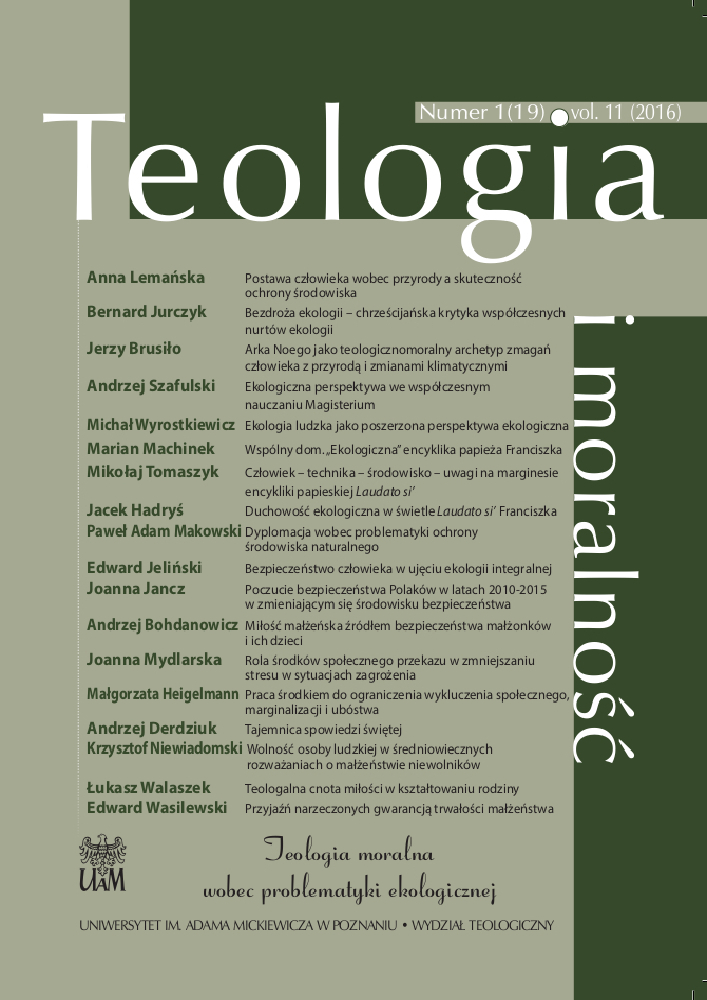Abstract
The article emphasizes the role of mass media in preserving the psychological well-being of the threatening situations sufferers and participants. In about 70% of the participants of threatening situations such as accidents, catastrophes and disasters, the stress level reduces the ability of planning their actions or rational behaviour. Naturally appearing stress reactions, such as panic, sense of security reduction or uncoordinated actions can be mitigated through a reliable and systematic information through the mass media about the nature of the threat and ways to counteract. Lots of the participants of the disaster feel lost and helpless, and mostly need reliable information to enhance their survival strengths, increase the sense of security and sense of influence on the situation, and to facilitate finding their loved ones. And although the role of mass media as coping with stress helpers seems to be in contradiction with the main idea of mass media activity in Poland – the pursuit of sensation, we assist good examples and hope, that the awareness of this mass media important role will increase.
References
Badura-Madej W., Leśniak E., Wojewódzki Ośrodek Interwencji Kryzysowej Ośrodek Pomocy i Interwencji Psychologicznej Collegium Medicum Uniwersytetu Jagiellońskiego, „Gazeta Wyborcza” nr 217, wydanie z dnia 17/09/1997 KRAJ, s. 20.
Bielicki P., Wawrzynowicz H., Osoby z dysfunkcjami a postępowanie ratownicze podczas pożaru, Poznań 2004.
Bokszczanin A., Predyktory radzenia sobie ze stresem po powodzi przez dorastających, „Czasopismo Psychologiczne” 2(2002), s. 187-194.
Freedy J.R., Simpson W.M., Disaster-Related Physical and Mental Health: A Role for the Family Physician, “Am Fam Physician” 2007, 75 (6), s. 841-846.
Konieczny J., Medycyna katastrof w ochronie zdrowia publicznego, w: Ratownictwo w Polsce. Lata 1990-2010, red. J. Konieczny, Warszawa–Poznań–Inowrocław 2010.
Mydlarska J., Dąbrowski M., Skitek-Adamczak I., Prewencja następstw katastrofy w ujęciu organizacyjnym, w: Ratownictwo medyczne. Kwalifikowana pierwsza pomoc, red. M. Witt, A. Dąbrowska, M. Dąbrowski, Poznań 2014.
Mydlarska J., Wsparcie psychologiczne w praktyce medycznej w kontekście medycyny ratunkowej, w: Psychologia w naukach medycznych, cz. 2, red. W. Strzelecki, M. Czarnecka-Iwańczuk,
M. Cybulski, Wydaw. Nauk. Uniw. Med. im. Karola Marcinkowskiego, Poznań 2012, s. 86-99.
Mydlarska J., Stres a wczesna interwencja kryzysowa, w: Ratownictwo w Polsce. Lata 1990-2010, red J. Konieczny, Warszawa–Poznań–Inowrocław 2010, s. 349-364.
Rauch S.A.M., Cahill S.P., Leczenie i zapobieganie zespołowi stresu pourazowego, „Psychiatria po Dyplomie” 2(2004), s. 19-23.
Rosenfeld L.B., Caye J.S., Ayalon O., Lahad M., When Their World Falls Apart. Helping Families and Children Manage the Effects of Disasters, DC: NASW Press., Washington 2005.
Sęk H., Wprowadzenie do psychologii klinicznej, Warszawa 2001.
Wang X., Gao L., Shinfuku N., Zhang H., Zhao C., Shen Y., Longitudinal Study of Earthquake-Related PTSD in a Randomly Selected Community Sample in North China, “Am J Psychiatry”, August 1, 2000; 157(8), s. 1260-1266.
Wawrzynowicz H., Romańczukiewicz J., The early psychological aid after acts of terrorism, w: Terrorist Pandora’s box. Analysis of chosen terrorist issue, ed. by J. Babiak, S. Wojciechowski, Poznań 2008, s. 51-58.
License

This work is licensed under a Creative Commons Attribution-NoDerivatives 4.0 International License.
